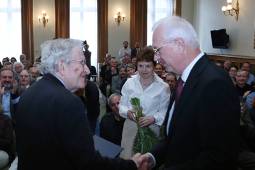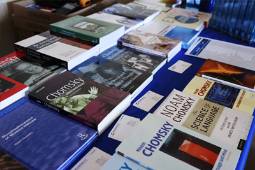One of the most important scientists of today, Professor Avram Noam Chomsky from Massachusetts Institute of Technology appeared on Monday, 2 June 2014 at the headquarters of the Academy of Sciences of the CR with a lecture “What Can We Understand?” On this occasion, he received from the hands of the President of the CAS Prof. Jiří Drahoš the honorary medal “De scientia et humanitate optime meritis”. Over the next few days, Prof. Chomsky will attend a linguistics conference organized by the Faculty of Arts of Palacký University in Olomouc and a public debate on current social trends in the Metropol Cinema in Olomouc.
Professor Noam Chomsky is generally consider as the most significant living linguist and is
usually labelled as the founder of modern linguistics. His revolutionary work in the field of
generative grammar was the crucial impulse for the development of theoretical linguistics in the
20th century and the interpretation of its results have played a fundamental rile in other
disciplines, such as the philosophy of language, philosophy of mind, psychology, cognitive science
or the theory of artificial intelligence. His analysis of formal grammar (and its hierarchization
according to generative strength) had a significant impact on the field of mathematical
informatics. More than any other scientist of our time, Noam Chomsky influenced the view of the
functioning of language, of the relation between universal language structures and specific
features of individual languages, of the sources of language competence, of the relations between
language, thought and communicative behaviour etc.
Chomsky’s criticism of the functioning of language in mass media and in the social mechanisms
of manipulation, control and repression, as well as his nonconformist positions on current trends
in social development, have had an exceptional response. His scientific renown and active role in
public events have made him one of the most influential (and most cited) intellectuals of our
time.
Video of Noam Chomsky´s lecture here
Photo: Stanislava Kyselová (Akademický bulletin)
2 Jun 2014














